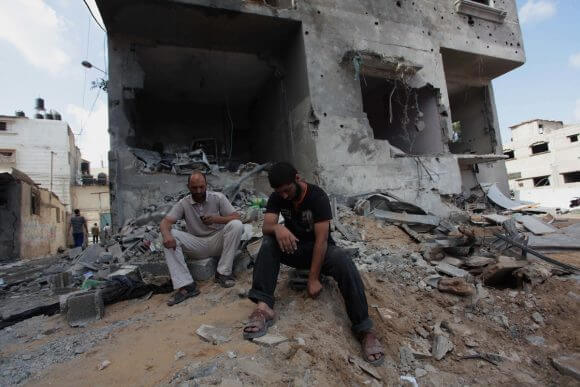Israel’s military cleared soldiers of criminal wrongdoing in alleged human rights violations committed during the 2014 summer war in Gaza, according to an army report published yesterday [PDF]. Investigations closed inquests into 13 incidents including the killing of three Palestinian families and other civilians, and the shelling of a medical clinic, Gaza’s main power plant, and a United Nations shelter, among other offenses.
“We did not expect anything less than Israel’s justification of war crimes,” chief Palestinian negotiator Saeb Erekat said after the publication of the military report, and urged the International Criminal Court to investigate the offenses.
In some of the cases of death and injury, the Israeli Defense Forces Military Advocate General (IDF MAG) admitted soldiers were negligent, but ruled their actions did not violate the rules of war.
A further seven criminal cases were opened for “exceptional incidents” where soldiers operating in Gaza are “accused of looting and of aiding and abetting looting.”
“The legal proceedings regarding these charges are underway at the present time,” said the report.
No charges in killings of three families
In deadly encounters with entire families where soldiers were not charged, the Israeli military said the targets were combatants and precautions were taken to limit civilian casualties in accordance with Israeli and international law. “The fact that, in practice, civilians who were uninvolved in the hostilities were harmed, is a regrettable result,” opened the report, “but [that] does not affect the legality of the attack ex post facto,” it continued.
The cases closed include the killings of seven members of the Ziyadeh family on July 20, 2014, 12 members of the Siyam family on July 21, 2014, and 15 persons during an attack on the Zouarob family on August 12, 2014.
Describing the killings from the Ziyadeh family, military investigators said despite the presences of civilians in the firing zone, no warning notices were issued.
“It would not have been possible to provide a warning prior to the strike on the building, as such a warning was expected to frustrate the objective of the attack,” said the report. Warning strikes or air-dropping precautionary leaflets were used in other circumstances throughout the war.
With respect to the Siyam family, military investigators stated their forces were uninvolved.“No attack – aerial or otherwise – that could have resulted in a strike on the family as alleged was carried out by IDF forces in the area in question and on the relevant date,” the report relayed.
The inquiry said a failed rocket launched by Palestinians operating in the area struck the relatives while they traveled on a nearby road. Although in that same incident the Israeli military destroyed the Siyam family home in an air strike, no persons were reported inside at the time.

No charges for attack on United Nations shelter
Investigators also chose not to indict soldiers for firing a precision-guided missile that killed “seven to fifteen” Palestinians who were taking shelter in an UNRWA school in Rafah on August 3, 2014. At the time the school was giving refuge to up to 2,900 individuals per day.
The Israeli military said their target was three motorists who were traveling by the front gate of the shelter at the time of the blasts. Their forces in the field did not know, before launching the strike, the impact would occur next to civilians.
“The operational authorities were not able to discern in real-time the group of civilians that were outside the school,” and therefore found no criminal liability in the deaths,” the report said.
UNRWA Spokesperson Chris Gunness told Mondoweiss his agency notified the Israeli military of the location of the shelter 33 times during the war, “the last time only an hour before the attack,” he said.
Gunness was not able to give a specific comment regarding the Israeli decision not to pursue criminal charges in this case–“UNRWA has not been given an opportunity to review the evidence,” he said. But the Israeli military is still considering prosecution on two on-going investigations into attacks on United Nations facilities. In separate air-strikes during July 2014, the IDF also fired on UNRWA shelters in both Beit Hanoun and Jabiliya, killing a combined 29 persons.
“No criminal responsibility seems to be accepted for any concluded cases concerning UNRWA premises,” Gunness said. “The families affected have had no effective redress and, from their perspective, this would certainly be seen as a further denial of their rights.”
During the 51-day war, Israeli forces targeted seven UNRWA facilities while they were in use as emergency shelters, supporting 250,000 displaced Palestinians. In these incidents, 44 were killed and 227 injured. United Nations properties and humanitarian sites are part of a special class of structures considered inviolable under international law.
Soldiers cleared for striking Gaza’s main power plant
One of the more high-profile attacks on Gaza’s infrastructure during the war was also closed by army examiners yesterday. From July 22 to July 29, 2014, the besieged strip’s main energy source, the Nusseirat power plant, was struck four times. The buildings are insured by the U.S. government.
Human Rights Watch estimated Gaza suffered a 20-percent loss to electric generation resulting from a blow to fuel reserves.
The military statement said the power plant was damaged in four separate strikes, three of which the IDF said were carried out by Palestinian forces. The fourth strike, the Israeli army did say came from their units. Yet the army closed the case, stating their attack was as an indirect hit.
“A large number of terror assets [were] adjacent to the power plant – at times at a distance of mere tens of meters,” said the military.
Days after the air strike on the facility, Human Rights Watch issued a differing take.
“Damaging or destroying a power plant, even if it also served a military purpose, would be an unlawful disproportionate attack under the laws of war, causing far greater civilian harm than military gain,” said the group.
“Deliberately attacking the power plant would be a war crime,” Eric Goldstein, deputy Middle East and North Africa director for Human Rights Watch, said in the same statement.
Wednesday’s report also initiated criminal investigations into property stolen from a Palestinian detained by Israeli soldiers inside of Gaza. “It was alleged that the soldiers took a cash sum from his pocket, which was not returned to him after his release,” the report said.
Another six incidents are under review where soldiers are accused of using “fire aimed at civilian buildings and cars in violation of IDF’s operational instructions; harm to civilians in violation of IDF’s operational instructions; damage intentionally inflicted to property in violation of IDF’s operational instructions; and looting,” said the brief.
In the 2014 war, Gaza suffered heavy casualties with the deaths of more than 2,100 Palestinians between July 8 and August 27, 2014. Palestinian forces killed 66 Israeli soldiers and a further seven civilians in Israel.
The Israeli military investigation into possible war crimes was conducted after human rights organizations, the United Nations, and individual Palestinians filed complaints.
Palestinian leaders are seeking prosecution for a number of incidents during the war at the International Criminal Court (ICC). These channels can only be pursued once officers at The Hague determine if Israel has adequately researched and charged war crimes violations in their own courts.
Chief Palestinian negotiator Saeb Erekat urged officials at the court to pursue their own proceedings.
“After Israel’s official position clearing itself of any responsibility and confirming its commitment to the practice of war crimes, we believe it is time for the Court to act,” he said.



Finally! It will be interesting to see if the Court’s judges have the necessary integrity to honestly consider the Nazi-style savagery committed by the zio IMmoral army of thugs and murderers.
I’m waiting for the investigation to clear of any wrongdoing the soldiers who gunned down four little boys playing ball on the beach. If there hadn’t been foreign reporters witnessing the event, we wouldn’t even have heard of it. But I’m sure there will be a good explanation for that one, too.
It is time these criminals are brought to the Hague and condemned as war criminals . And yes, this is another Holocaust in a different form, created by Zionist Racist Nationalism.
Hague? Its name is ‘Den Haag’ (the hedge, meaning the boundary of the forest of the duke ) and it’s always used in full, so the ‘The’ is required.
I guess Israel demonstrates to Western Civilization how one “negotiates” acceptable ethnic cleansing post 1945 Nuremberg & its Geneva progeny. Remember when Trump was slammed as anti-semitic for praising a room full of Jewish people for “knowing how to negotiate”?